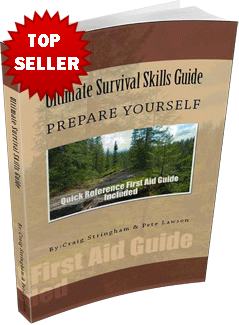How to Start Prepping in 3 Easy Steps
By Daisy Luther
One day, you’re just moving through life with everyone else in your office or at your church, and then, for whatever reason, the reality of how tenuous our current lifestyle is, hits you squarely between the eyes. You realize that electricity and grocery stores and transportation are all things that you’ve been taking for granted and that these things could actually disappear. Maybe you’re concerned about a natural disaster. Perhaps you saw something on the evening news. It could even be a job loss that puts these things out of reach.
But whatever the reason, suddenly, you know in your heart that you need to prepare for a different type of future, just in case.
Where on earth do you even start with something like that?
[do_widget id=text-16]
Start with information
Before you start making enormous purchases or moving your family to a bunker, take some time to learn.
Information.
That is the key that unlocks the door to preparedness.
When you begin reading websites about prepping, sometimes it can be overwhelming. You see people talking about their one-year food supplies, their bug-out lodges, their ammo collection, and their homestead that is so far out in the wilderness that they have to climb a big pine tree on top of the mountain to get an internet connection (where they then boast online about their seclusion on a prepper forum).
Most preppers are just regular folks with a self-reliant mindset.
 Getting started does not require a $20,000 investment or your children feverishly packing beans and rice into Ziplock bags late into the night. It requires enough information to properly assess your situation. It requires some guidance to help you develop a plan to keep your family safe, housed, and fed, regardless of what comes in the future.
Getting started does not require a $20,000 investment or your children feverishly packing beans and rice into Ziplock bags late into the night. It requires enough information to properly assess your situation. It requires some guidance to help you develop a plan to keep your family safe, housed, and fed, regardless of what comes in the future.
So I want you to do three things. First, bookmark some websites. Second, begin building your preparedness library with books. Finally, create your own reference book from the information you’re collecting.
#1. Bookmark these preparedness websites. (Free)
The internet is a wonderful place, and best of all, this knowledge can be found for FREE! The more you know about crisis situations, the more ready you will be to face them. Some sites are friendlier to beginners than others, so if you stumble upon a forum where people seem less than enthusiastic about helping people who are just starting out, don’t let it get you down. Move on and find a site that makes you feel comfortable. Following are some of my favorites, and the link will take you to a good starting point on these sites. In no particular order:
Some sites are friendlier to beginners than others, so if you stumble upon a forum where people seem less than enthusiastic about helping people who are just starting out, don’t let it get you down. Move on and find a site that makes you feel comfortable. If you see them utter the words, “If you aren’t already prepared, it’s too late,” run, don’t walk, away from them. No one needs that kind of doom and gloom. It’s stressful, unhelpful, and honestly, kind of mean. Plus, I firmly believe it’s never too late as long as you just get started.
Following are some of my favorites, and the link will take you to a good starting point on these sites. In no particular order:
- The Organic Prepper (obviously!)
- Ready Nutrition
- Graywolf Survival
- SHTFplan
- Underground Medic
- Survival Blog
- Backdoor Survival
- The Survival Mom
- Herbal Prepper
#2. Build your library. (Small expense)
This is where some money could come into play. Most of the time, people in the preparedness world like to have hard copies of important information. This way, if the power goes out and you can’t access the internet or recharge your Kindle, you still have access to vital advice.
Some of these books are for just such an event, while others are guides to building your self-reliance skills. Commit to picking up a good book each pay period until you have a library to reference during any type of scenario.
The Prepper’s Blueprint: The Step-By-Step Guide To Help You Through Any Disaster
(This is the be-all and end-all Bible of prepping. I wish I could put my own book first, but Tess’s book is the most complete compendium out there, broken into easy, manageable steps.)
The Pantry Primer: A Prepper’s Guide to Whole Food on a Half-Price Budget(This is my newest book, which outlines building your pantry while on a strict budget)
SAS Survival Guide: How to Survive in the Wild, on Land or Sea (I keep this little gem in my vehicle, my bug out bag, and in my kids’ backpacks. It doesn’t go into lots of detail, but if you find yourself stranded in the middle of nowhere, this small book could save your life.)
The Encyclopedia of Country Living, 40th Anniversary Edition: The Original Manual of Living Off the Land & Doing It Yourself(A compendium of all things self-reliance)
Prepper’s Home Defense: Security Strategies to Protect Your Family by Any Means Necessary(If you can’t protect it, you don’t own it. It’s that simple.)
How to Survive the End of the World as We Know It: Tactics, Techniques, and Technologies for Uncertain Times(By James Wesley Rawles, who many consider to be the “Father” of the modern preparedness movement)
The Prepper’s Pocket Guide: 101 Easy Things You Can Do to Ready Your Home for a Disaster(Quick, inexpensive preparedness steps that anyone can take)
The Survival Medicine Handbook: A Guide for When Help is Not on the Way(It’s vital to have a guide on hand that doesn’t rely on 911 for serious injuries, in the event that you’re completely on your own)
The Organic Canner(It’s awesome to grow your food, but how will you make it last through the winter, particularly during an off-grid scenario?)
The Complete Tightwad Gazette(While this book is about hardcore frugality, trust me, there’s crossover. There are a lot of great suggestions for creating stockpiles on a budget, living simply, and doing things the old-fashioned way. And saving money is always a good idea, so that you can use it to help you become more prepared.)
Be sure to check out used bookstores, libraries, and garage sales, too. Look for books that teach self-reliant skills like sewing, gardening, animal husbandry, carpentry, repair manuals, scratch cooking, and plant identification. You can often pick these up for pennies, and older books don’t rely on expensive new technology or tools for doing these tasks.
#3. Start a notebook. (Free)
The next step is to create a preparedness binder. If you use a 3 ring binder (swipe your kid’s school binder from last year for a freebie), you can print information from your favorite websites and keep it in the binder for future reference. You should also make your own section, with notes, lists, important phone numbers, and addresses. Add something with pockets to keep photocopies of ID, insurance documents, and physical maps in case GPS is not working.
Keep this in a safe, accessible place. In the event that you have to bug out, you should be able to grab this and take it with you. Some people keep a second copy of the binder in their vehicle with them, in case disaster strikes when they’re away from home. If you do this, consider excluding your personal information from the travel binder, in case it gets stolen.
And….go!
If you’re new to this, there’s no better time to start than right this minute.
Start reading. Do all of the plotting and planning, and then put your plans into action as your budget allows.
Whatever you do, stop waiting around. Disasters won’t wait until it’s a convenient time for you.
If you have been at this for a while, please share your experience with newbie preppers in the comments below. If you have friends and loved ones you’d like to help get started, send them this article to start them on their journey. Help encourage people to join our community of self-reliance! By turning neighbors and loved ones into allies, you’re building a team instead of burdening yourself with added responsibilities, or worse, having to turn them away later when they’re desperate.
Daisy Luther lives in a small village in the Pacific Northwestern area of the United States. She is the author of The Organic Canner, The Pantry Primer: How to Build a One Year Food Supply in Three Months, and the soon-to-be-released The Prepper’s Water Survival Guide: Harvest, Treat, and Store Your Most Vital Resource. On her website, The Organic Prepper, Daisy uses her background in alternative journalism to provide a unique perspective on health and preparedness, and offers a path of rational anarchy against a system that will leave us broke, unhealthy, and enslaved if we comply. Daisy’s articles are widely republished throughout alternative media. You can follow her on Facebook,Pinterest, and Twitter,.




